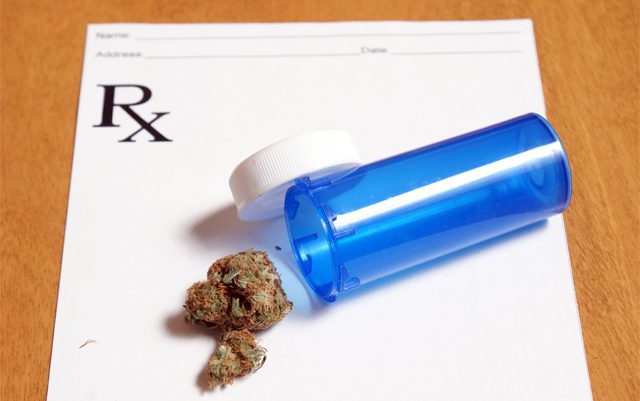Since 2014, medical marijuana laws in the United States have been protected from federal government interference by very little. The only thing really standing in the way is a spending bill that is renewed annually, in which Congress has continuously included a provision that prevents the Department of Justice (DOJ) from prosecuting medical marijuana businesses and patients operating within state laws. Earlier this year, a version of the spending bill included a provision that included both the medical and recreational markets – but it was revised before being finalized, once again only covering state-legal medical marijuana.
Not for the first time, President Trump signed the spending bill – but made sure to include a signing statement basically saying that he has the right to ignore that provision, whether congress approved it or not. Trump has been back and forth about his support for legalization, making statements like the one below, while also claiming to support states’ rights to legalize.
“Division B, section 531 of the Act provides that the Department of Justice may not use any funds made available under this Act to prevent implementation of medical marijuana laws by various States and territories,” Trump wrote in a signing statement. “My Administration will treat this provision consistent with the President’s constitutional responsibility to faithfully execute the laws of the United States.”
Along with protections to the state-legal marijuana industries, the year’s spending bill also included provisions specifically regarding hemp and CBD.
One provision requires the National Institute on Drug Abuse (NIDA) to provide a report on the barriers to researching medical marijuana and other Schedule I drugs, while another wants the National Institutes of Health to invest in studying the medicinal effects of cannabidiol and cannabigerol. Yet another provision wants to see the Agency for Healthcare Research and Quality to put at least $1 million into grants to determine if CBD and kratom could be safer alternatives to opioids.
Congress made sure to cover a lot of bases this time around, also including $2 million to be allocated to the Food and Drug Administration (FDA) to develop regulations for hemp-derived CBD. This should include “research, policy evaluation, market surveillance, issuance of an enforcement discretion policy, and appropriate regulatory activities with respect to products under the jurisdiction of the FDA which contain CBD and meet the definition of hemp.” An initial report is expected within 60 days, while a study of the current CBD marketplace is due back in 180 days.
Overall, there was a lot of good that happened in this federal spending bill for the cannabis industry – even if protections for state-legal recreational markets, banking access for cannabis businesses and greater accessibility for veterans didn’t make it through.







“My Administration will treat this provision consistent with the President’s constitutional responsibility to faithfully execute the laws of the United States.”
Why hasn’t Congress reconstructed the federal definition of marijuana in the necessary and proper way to clearly define the meaning of marijuana along with the controls from the 2nd, 9th, 10th, and 14th Amendments, so that the President’s Administration can faithfully execute marijuana law in accordance with the Constitution, like this:
Sec. 802.
(16) The term “marijuana” means all parts of the smoke produced by the combustion of the plant Cannabis sativa L., which is, as are the viable seeds of such plant, prohibited to be grown by or sold by any publicly traded corporation or subsidiary company, and such smoke is prohibited to be inhaled by any child or by any person bearing any firearm, as is their intake of any part or any product of such plant containing more than 0.3% THC by weight unless prescribed to such child by an authorized medical practitioner.
Malformed federal laws facilitate their unfaithful execution. How can the President’s Administration faithfully execute marijuana law, when Congress created the current federal definition of marijuana to be circumlocutory, deceptive, and malformed, like this:
Sec. 802.
(16)(A) Subject to subparagraph (B), the term “marihuana” means all parts of the plant Cannabis sativa L., whether growing or not; the seeds thereof; the resin extracted from any part of such plant; and every compound, manufacture, salt, derivative, mixture, or preparation of such plant, its seeds or resin.
(B) The term “marihuana” does not include (i) hemp, as defined in section 297A of the Agricultural Marketing Act of 1946; or (ii) the mature stalks of such plant, fiber produced from such stalks, oil or cake made from the seeds of such plant, any other compound, manufacture, salt, derivative, mixture, or preparation of such mature stalks (except the resin extracted therefrom), fiber, oil, or cake, or the sterilized seed of such plant which is incapable of germination.
People can contact their members of Congress about reconstructing the malformed federal definition of marijuana to make it literally uphold the Constitution, to facilitate its faithful execution by the President’s Administration.
Just wanted to let u know that I smoke every day all day.. and drive every day smoking out of my dugout ,sativa and smoke at home out of my dugout, indica then is bed time… love ur show getting lots of info still living in lake Charles Louisiana still not having recreational yet .. but nothing will change for me because I will still smoke regardless of status of state…